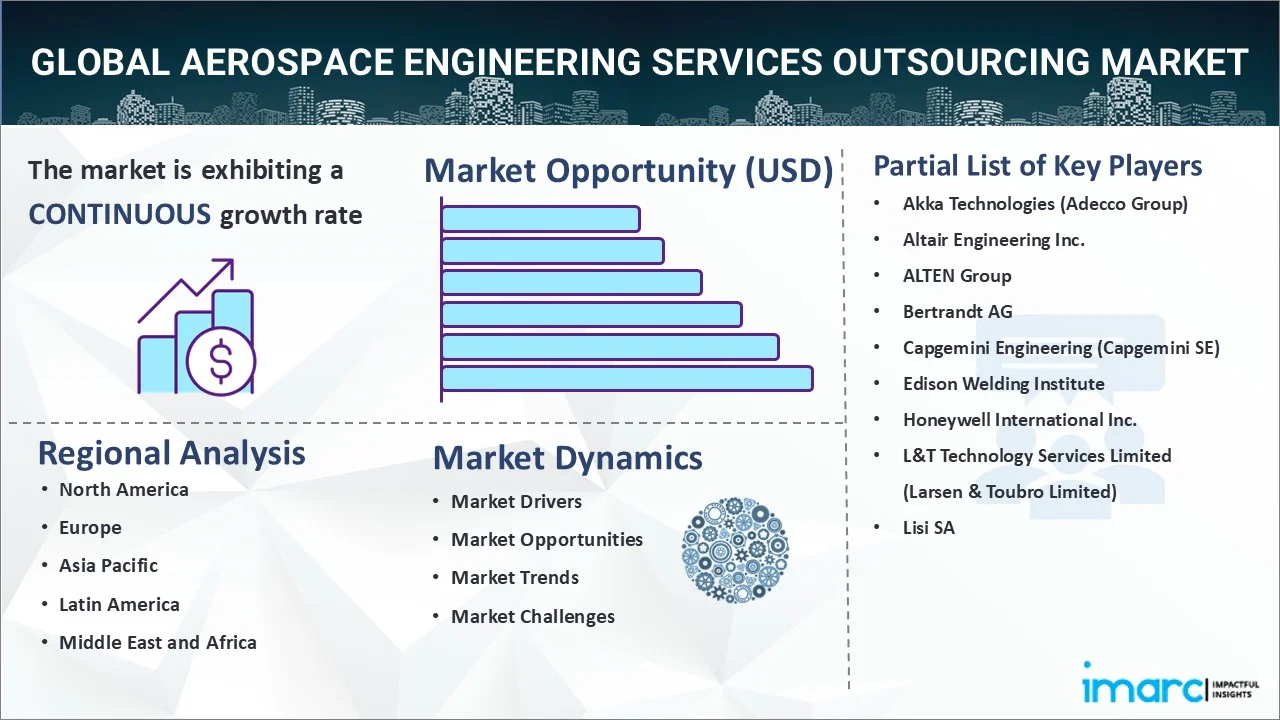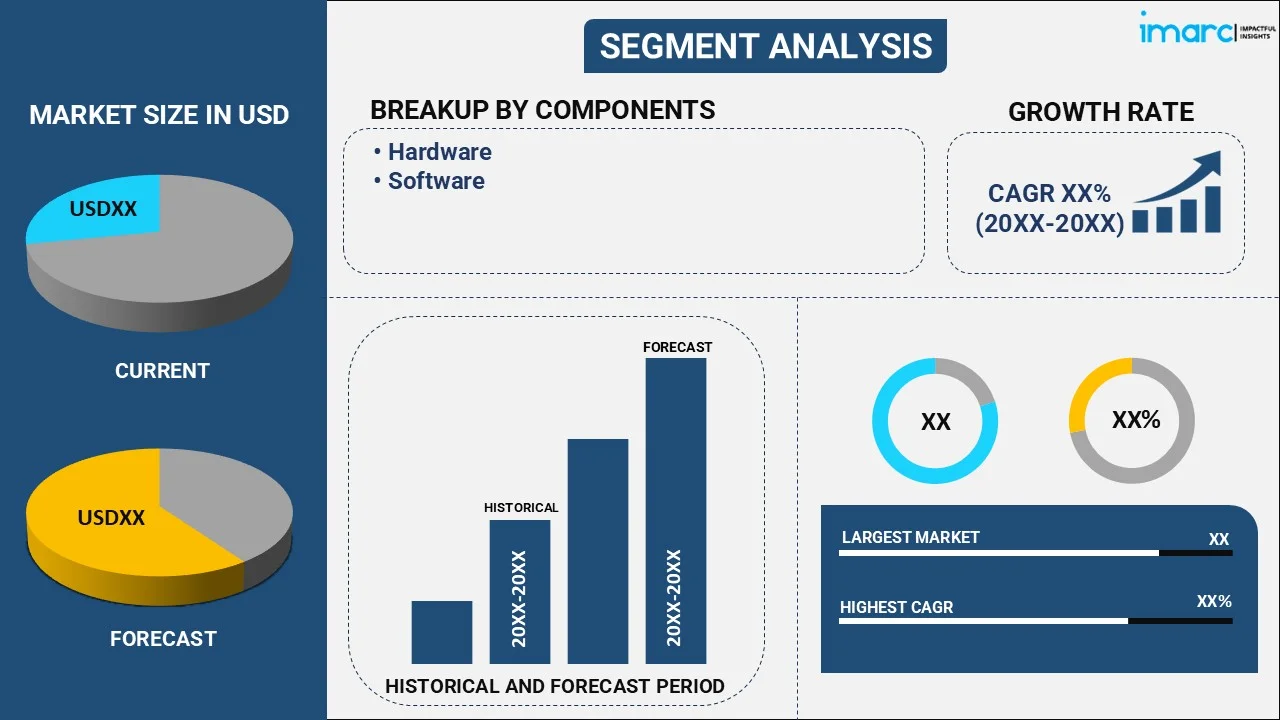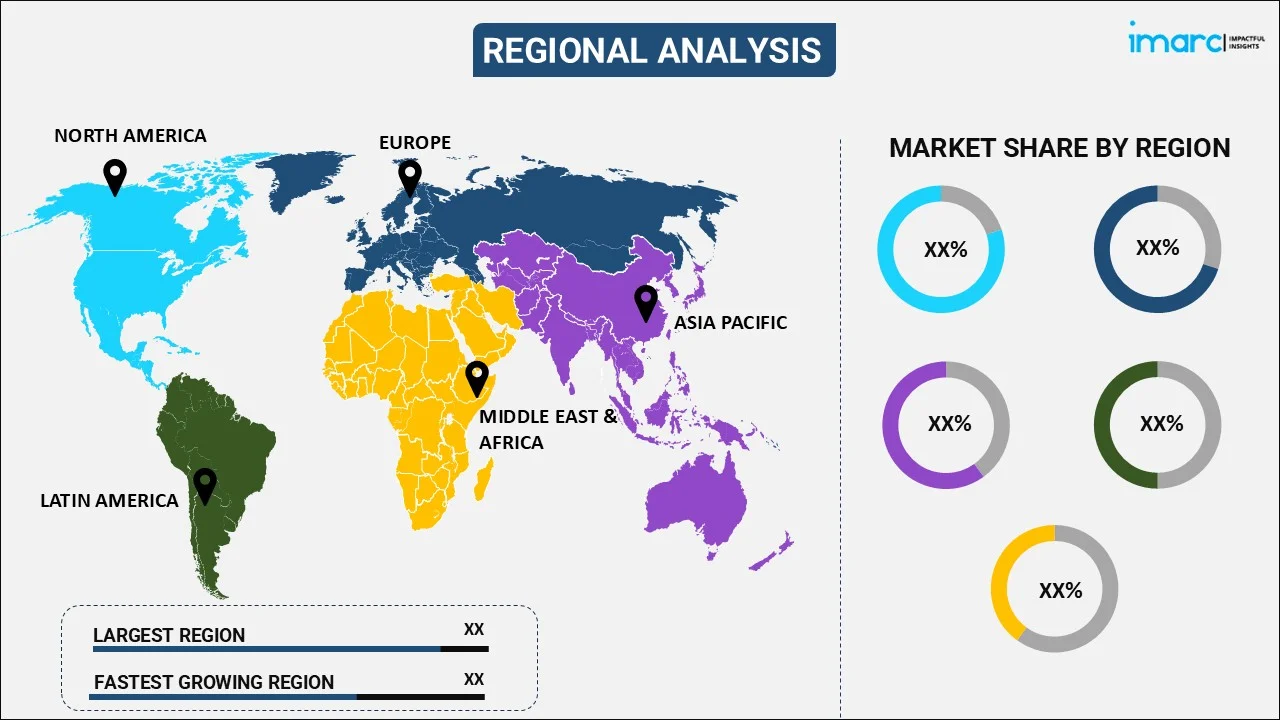
Aerospace Engineering Services Outsourcing Market Report by Component (Hardware, Software), Service (Design and Engineering, Manufacturing Support, Security and Certification, After-Market Services), Location (On-Shore, Off-Shore), and Region 2025-2033
Market Overview:
The global aerospace engineering services outsourcing market size reached USD 114.8 Billion in 2024. Looking forward, IMARC Group expects the market to reach USD 622.5 Billion by 2033, exhibiting a growth rate (CAGR) of 19.64% during 2025-2033. The growing demand for cost optimization and resource efficiency solutions, rising complexity of aerospace technologies, and increasing demand for innovative products and services in the aerospace sector are some of the major factors propelling the market.
|
Report Attribute
|
Key Statistics
|
|---|---|
|
Base Year
|
2024 |
|
Forecast Years
|
2025-2033
|
|
Historical Years
|
2019-2024
|
| Market Size in 2024 | USD 114.8 Billion |
| Market Forecast in 2033 | USD 622.5 Billion |
| Market Growth Rate (2025-2033) | 19.64% |
Aerospace Engineering Services Outsourcing Market Analysis:
- Major Market Drivers: The aerospace engineering services outsourcing market is mainly driven because of the rising demand for innovative and technologically advanced aircraft. As airlines and defense sectors nowadays seek more fuel efficient and environmentally friendly designs increasingly turn to outsourcing in order to access specialized engineering expertise and cost-effective solution. In line with this, the increase in global air traffic and the push for modernizing military fleets is also driving the aerospace engineering services outsourcing market growth. Furthermore, the gradual adoption of there's still technologies like artificial intelligence and Internet of Things in designing and manufacturing processes allows the outsourcing firms to offer more sophisticated services thereby driving the market growth.
- Key Market Trends: The aerospace engineering services outsourcing market is experiencing a significant growth mainly driven by the rising demand for innovative aerospace technologies and the need to reduce the operational costs. Key trends in this sector includes the increase in adoption of digital technologies like artificial intelligence and Internet of Things to enhance the design and manufacturing processes with the growing focus on sustainability. In line with this, collaborations between aerospace firms and specialized engineering service providers are becoming more common to influence external expertise and advanced technologies. These partnerships are important in meeting the is stringent regulatory standards and safety requirements of aerospace industry.
- Geographical Trends: The aerospace engineering services outsourcing market growth is influenced by various geographical trends. With notable growth in regions such as North America Europe and Asia Pacific, North America remains a leader because of the presence of major aerospace manufacturers and technological innovators. Europe follows closely mainly driven by advancements in aerospace technologies and strong government support. Meanwhile, Asia-Pacific is rapidly emerging as a key player because of increase in investments in aerospace infrastructures and the growing demand for commercial aircraft. These regions are capitalizing on global shift towards most cost effective engineering solutions thereby fueling the aerospace engineering services outsourcing market growth.
- Competitive Landscape: Some of the major market players in the keyword industry include Akka Technologies (Adecco Group), Altair Engineering Inc., ALTEN Group, Bertrandt AG, Capgemini Engineering (Capgemini SE), Edison Welding Institute, Honeywell International Inc., L&T Technology Services Limited (Larsen & Toubro Limited), Lisi SA, among many others.
- Challenges and Opportunities: The aerospace engineering services outsourcing market presents both challenges and opportunities. A key challenge is maintaining high quality standards amidst stringent regulatory compliance and security concerns. The intellectual property risks associated with outsourcing critical components further complicate matters. On the opportunity side, outsourcing allows the companies to reduce the cost and focus on core competencies driving innovations and efficiency. In line with this, the rising demand for advanced aerospace technologies such as unmanned aerial vehicles and ecofriendly aircraft offers significant growth prospect for service providers.

Aerospace Engineering Services Outsourcing Market Trends/Drivers:
Rising complexity of aerospace technologies
The rising complexity of aerospace technologies due to the advancements in areas, such as avionics, materials science, and propulsion systems, is contributing to the aerospace engineering services outsourcing market growth. In addition, aerospace companies often lack in-house resources with the requisite specialized expertise to address these complexities comprehensively. As a result, outsourcing engineering services provide a strategic solution to tap into external knowledge and skills. Moreover, outsourcing partners bring domain-specific proficiency that is crucial for designing, testing, and validating intricate aerospace components and systems. For instance, in 2023, L&T Technology Services was selected as a strategic engineering partner to Airbus, providing advanced engineering capabilities and digital manufacturing services. LTTS is expected to support Airbus in key verticals and technology areas for its ongoing commercial and innovation programs, executing engineering support from its offshore locations in India and near-shore center in France. Furthermore, aerospace firms can ensure the development of these solutions while maintaining a competitive edge in the market by collaborating with specialized providers.
Increasing demand for cost optimization and resource efficiency solutions
Aerospace engineering services outsourcing offers an enhanced approach to managing costs in an industry characterized by high research and development expenditures. In line with this, maintaining an in-house engineering team requires substantial investments in infrastructure, training, and personnel management. Apart from this, companies can redirect resources for core business functions while benefiting from the expertise of external partners through outsourcing, which is offering a positive market outlook. For instance, Tata Boeing Aerospace, a joint venture, produces Apache helicopter fuselages and 737 vertical fin structures. Boeing plans to establish a new BCF line in Hyderabad and offer customized efficiency and safety improvement projects for airline customers through its upcoming Global Support Center and India Logistics Center. This approach also provides flexibility in managing fluctuating workloads and enables businesses to scale their engineering efforts efficiently without the constraints of fixed in-house capacity. Furthermore, the rising adoption of these outsourcing services due to their cost-effectiveness and resource efficiency is bolstering the growth of the market.
Growing demand for innovative products in the aerospace sector
There is a rise in the demand for innovative products in the aerospace industry to enhance efficiency and maintain a competitive edge. In addition, outsourcing engineering services enables companies to encourage research and development (R&D) activities by leveraging the experience and capabilities of external partners. Collaborating with specialized providers allows aerospace firms to tap into different perspectives and cross-industry insights that facilitate the creation of novel solutions. For instance, SAS International has worked closely with Ukraine-based hardware and aerospace technology companies for over five years to develop strategic marketing and system development concepts for the U.S. space industry market. Besides this, companies can focus on strategic innovation by focusing their internal teams on core competencies rather than spreading resources across various engineering tasks. Furthermore, the rising adoption of outsourcing due to the increasing demand for advanced technologies is propelling the growth of the market.
Aerospace Engineering Services Outsourcing Industry Segmentation:
IMARC Group provides an analysis of the key trends in each segment of the global aerospace engineering services outsourcing market report, along with forecasts at the global, regional, and country levels for 2025-2033. Our report has categorized the market based on component, service, and location.
Breakup by Component:

- Hardware
- Software
Hardware represents the largest market segment
The report has provided a detailed breakup and analysis of the market based on the component. This includes hardware and software. According to the report, hardware represented the largest segment. Hardware is an essential component that comprises the tangible physical components used in aerospace systems and technologies. These components include avionics systems, sensors, actuators, propulsion systems, mechanical structures, and electronic modules. Hardware engineering involves designing, developing, and testing these physical elements to ensure their functionality, reliability, and adherence to stringent industry standards. Hardware engineering plays a crucial role in creating enhanced and efficient systems that withstand the operational environments of aviation and space exploration. Outsourcing hardware engineering services allows aerospace companies to access specialized expertise for designing intricate components, optimizing performance, and ensuring compatibility with integrated systems.
Breakup by Service:
- Design and Engineering
- Manufacturing Support
- Security and Certification
- After-Market Services
Manufacturing support accounts for the majority of the market share
The report has provided a detailed breakup and analysis of the market based on the service. This includes design and engineering, manufacturing support, security and certification, and after-market services. According to the report, manufacturing support represented the largest segment. Manufacturing support services comprise a range of activities that facilitate the production and assembly of aerospace components and systems. These services comprise process planning, quality control, supply chain management, and production optimization. Aerospace companies can leverage external expertise to streamline production processes, enhance product quality, and ensure adherence to strict industry regulations by collaborating with outsourcing partners for manufacturing support. Manufacturing support services often involve the application of advanced technologies, such as automation and additive manufacturing, to improve efficiency and reduce production costs.
Breakup by Location:
- On-Shore
- Off-Shore
On-shore holds the biggest market share
The report has provided a detailed breakup and analysis of the market based on the location. This includes on-shore and off-shore. According to the report, on-shore represented the largest segment. On-shore outsourcing involves collaborating with external service providers within the same country or geographic region. This approach offers distinct advantages, such as cultural and linguistic alignment, proximity for easier communication, and potential regulatory familiarity. On-shore outsourcing can also address concerns related to intellectual property protection and data security, often associated with off-shore outsourcing. Aerospace firms can tap into local talent pools and leverage skilled professionals who understand the local industry landscape through on-shore outsourcing. This approach provides a balance between cost-effectiveness and proximity, which makes it an appealing option for companies seeking to outsource while maintaining a degree of familiarity and control over their engineering projects.
Breakup by Region:

- North America
- United States
- Canada
- Asia Pacific
- China
- Japan
- India
- South Korea
- Australia
- Indonesia
- Others
- Europe
- Germany
- France
- United Kingdom
- Italy
- Spain
- Russia
- Others
- Latin America
- Brazil
- Mexico
- Others
- Middle East and Africa
North America exhibits a clear dominance, accounting for the largest aerospace engineering services outsourcing market share
The market research report has also provided a comprehensive analysis of all the major regional markets, which include North America (the United States and Canada); Asia Pacific (China, Japan, India, South Korea, Australia, Indonesia, and others); Europe (Germany, France, the United Kingdom, Italy, Spain, Russia, and others); Latin America (Brazil, Mexico, and others); and the Middle East and Africa. According to the report, North America accounted for the largest market share.
North America held the biggest market share due to the presence of a highly skilled workforce, coupled with advanced infrastructure. Apart from this, favorable business environments are contributing to the growth of the market in the region. In line with this, the increasing development of advanced aerospace solutions is bolstering the growth of the market in the North America region. Furthermore, the rising demand for improved aerospace solutions is impelling the growth of the market.
Competitive Landscape:
Key players are focusing on building specialized expertise in niche areas of aerospace engineering, such as avionics, propulsion systems, and structural design. This allows them to offer highly tailored solutions to aerospace clients seeking in-depth technical knowledge. In line with this, they are investing significantly in research and development (R&D) activities to drive innovation. They are working on developing next-generation technologies, materials, and processes that can improve aircraft performance, safety, and efficiency. Apart from this, many companies are embracing digital technologies, such as simulation, data analytics, and virtual reality (VR), to optimize engineering processes, reduce development cycles, and enhance collaboration among global teams.
The report has provided a comprehensive analysis of the competitive landscape in the market. Detailed profiles of all major companies have also been provided. Some of the key players in the market include:
- Akka Technologies (Adecco Group)
- Altair Engineering Inc.
- ALTEN Group
- Bertrandt AG
- Capgemini Engineering (Capgemini SE)
- Edison Welding Institute
- Honeywell International Inc.
- L&T Technology Services Limited (Larsen & Toubro Limited)
- Lisi SA
(Please note that this is only a partial list of the key players, and the complete list is provided in the report.)
Recent Developments:
- In 2022, Altair, a global leader in computational science and artificial intelligence (AI), acquired Concept Engineering, the leading provider of electronic system visualization software that accelerates the development, manufacture, and service of complex electrical and electronic systems in various industries, such as aerospace, automotive, and industrial.
- In 2023, Honeywell acquired the heads-up display (HUD) technology assets of Swedish aerospace and defense company, Saab. This assists in strengthening Honeywell’s avionics and aviation safety product lines by improving situational awareness, especially at night or in difficult weather conditions.
- In 2023, ALTEN Group, headquartered in Paris, France and a market leader in engineering and technology consulting services, completed the strategic acquisition of Accord Global Technology Solutions. This strategic acquisition combines ALTEN's scale and technology diversity with the digital innovation and know-how of Accord Global Technology Solutions in the aerospace and automotive industries.
Aerospace Engineering Services Outsourcing Market Report Scope:
| Report Features | Details |
|---|---|
| Base Year of the Analysis | 2024 |
| Historical Period | 2019-2024 |
| Forecast Period | 2025-2033 |
| Units | Billion USD |
| Scope of the Report | Exploration of Historical Trends and Market Outlook, Industry Catalysts and Challenges, Segment-Wise Historical and Predictive Market Assessment:
|
| Components Covered | Hardware, Software |
| Services Covered | Design and Engineering, Manufacturing Support, Security and Certification, After-Market Services |
| Locations Covered | On-Shore, Off-Shore |
| Regions Covered | Asia Pacific, Europe, North America, Latin America, Middle East and Africa |
| Countries Covered | United States, Canada, Germany, France, United Kingdom, Italy, Spain, Russia, China, Japan, India, South Korea, Australia, Indonesia, Brazil, Mexico |
| Companies Covered | Akka Technologies (Adecco Group), Altair Engineering Inc., ALTEN Group, Bertrandt AG, Capgemini Engineering (Capgemini SE), Edison Welding Institute, Honeywell International Inc., L&T Technology Services Limited (Larsen & Toubro Limited), Lisi SA, etc. |
| Customization Scope | 10% Free Customization |
| Post-Sale Analyst Support | 10-12 Weeks |
| Delivery Format | PDF and Excel through Email (We can also provide the editable version of the report in PPT/Word format on special request) |
Key Benefits for Stakeholders:
- IMARC’s industry report offers a comprehensive quantitative analysis of various market segments, historical and current market trends, market forecasts, and dynamics of the aerospace engineering services outsourcing market from 2019-2033.
- The research report study provides the latest information on the market drivers, challenges, and opportunities in the global aerospace engineering services outsourcing market.
- The study maps the leading, as well as the fastest-growing, regional markets. It further enables stakeholders to identify the key country-level markets within each region.
- Porter's five forces analysis assist stakeholders in assessing the impact of new entrants, competitive rivalry, supplier power, buyer power, and the threat of substitution. It helps stakeholders to analyze the level of competition within the aerospace engineering services outsourcing industry and its attractiveness.
- Competitive landscape allows stakeholders to understand their competitive environment and provides an insight into the current positions of key players in the market.
Key Questions Answered in This Report
The global aerospace engineering services outsourcing market was valued at USD 114.8 Billion in 2024.
We expect the global aerospace engineering services outsourcing market to exhibit a CAGR of 19.64% during 2025-2033.
The rising adoption of aerospace engineering services outsourcing, as it assists in developing cutting-edge technologies and integrating them into aerospace vehicle systems that are used for defense, transportation, communications, and exploration applications, is primarily driving the global aerospace engineering services outsourcing market.
The sudden outbreak of the COVID-19 pandemic had led to the implementation of stringent lockdown regulations across several nations, resulting in the decline of numerous aviation activities, thereby negatively impacting the global market for aerospace engineering services outsourcing.
Based on the component, the global aerospace engineering services outsourcing market can be segmented into hardware and software. Currently, hardware holds the majority of the total market share.
Based on the service, the global aerospace engineering services outsourcing market has been divided into design and engineering, manufacturing support, security and certification, and after-market services. Among these, manufacturing support currently exhibits a clear dominance in the market.
Based on the location, the global aerospace engineering services outsourcing market can be categorized into on-shore and off-shore. Currently, on-shore accounts for the largest market share.
On a regional level, the market has been classified into North America, Asia-Pacific, Europe, Latin America, and Middle East and Africa, where North America currently dominates the global market.
Some of the major players in the global aerospace engineering services outsourcing market include Akka Technologies (Adecco Group), Altair Engineering Inc., ALTEN Group, Bertrandt AG, Capgemini Engineering (Capgemini SE), Edison Welding Institute, Honeywell International Inc., L&T Technology Services Limited (Larsen & Toubro Limited), and Lisi SA.
Need more help?
- Speak to our experienced analysts for insights on the current market scenarios.
- Include additional segments and countries to customize the report as per your requirement.
- Gain an unparalleled competitive advantage in your domain by understanding how to utilize the report and positively impacting your operations and revenue.
- For further assistance, please connect with our analysts.
 Request Customization
Request Customization
 Speak to an Analyst
Speak to an Analyst
 Request Brochure
Request Brochure
 Inquire Before Buying
Inquire Before Buying




.webp)




.webp)












